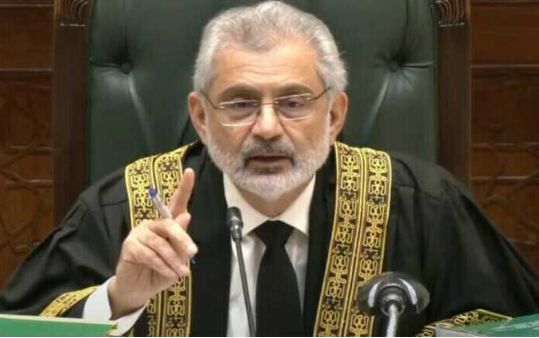Three-member bench suspends Peshawar High Court, Election Commission verdicts
Ansar M Bhatti
ISLAMABAD: To the disappointment of those government functionaries who wanted to amend Article 175 and 178 of the Constitution to fix the tenure of the Chief Justice of Pakistan for three years or increase the retirement age for apex court judges from 65 years to 68 years, the Supreme Court on Monday suspended the orders of the Peshawar High Court and Election Commission of Pakistan.
The Peshawar High Court had rejected the Sunni Ittehad Council plea seeking reserved seats. The Election Commission of Pakistan had allocated the reserved seats to other political parties. A total of 78 seats were allocated to difference political parties. The allocation of reserved seats had altered the voting structure in the parliament in favour of the sitting government granting it two-thirds majority.
The Supreme Court also ordered that in future these 78 lawmakers shall not take part in any vote counting in the parliament. After this order, the government has lost two-thirds majority, which means the government may not be able to amend the Article 175 and 76 dealing with judge tenure and appointment.
In March, a five-member PHC bench, headed by Chief Justice Ibrahim Khan, and comprising Justice Ishtiaq Ibrahim, Justice Ijaz Anwar, Justice Arshad Ali and Justice Shakeel Ahmad had rejected the SIC’s petition against ECP’s decision depriving it of reserved seats.
The electoral body had ruled that the SIC was not eligible for reserved seats allotted to women and minorities “due to non-curable procedural and legal defects and violations of mandatory provisions of the Constitution”.
While rejecting the plea of SIC, the ECP accepted applications of the opposing parties and decided that the seats in the National Assembly would not remain vacant and be allocated by a proportional representation process of political parties on the basis of seats won by political parties.
In response, the SIC moved the SC court last month urging the apex court to allot the party the 67 women and 11 minority seats in the National and provincial assemblies and set aside the PHC ruling.
The SIC’s plea contends that reserved seats for women and minorities are given to the parties in the national and provincial assemblies on the basis of proportional representation and no party can be given more reserved seats than its representation.
It is to be noted that the issue of reserved seats had been a point of contention between the SIC, which primarily comprises Pakistan Tehreek-e-Insaf-backed independent candidates, and the ruling parties notably Pakistan Muslim League-Nawaz (PML-N), the Pakistan Peoples Party (PPP) and others.
Dozens of members of the PPP, PML-N, Muttahida Qaumi Movement-Pakistan (MQM-P) have taken oath on reserved seats following the PHC’s verdict.
During the hearing today, Justice Shah, while referring to the ECP’s decision to distribute the reserved seats, questioned how political parties can secure seats other than those for which they were eligible with regard to their proportional presence in the assemblies.
“Can the remaining seats be given to them [political parties]? Is there anything related to it provisioned in the law?” the judge questioned.
He further asked: “If there is no such provision in the law, then is it not against the constitutional scheme to do so?”
The judge inquired if the reserved seats can be redistributed in the second phase.
“The real issue is that of the public mandate [and] we have to protect it,” Justice Shah noted.
Meanwhile, expressing his views, Justice Minallah inquired about the legality of indirectly ignoring the mandate of a political party and also questioned what is to be done with the remaining reserved seats.
Reacting to the apex court’s decision, PTI Chairman Barrister Gohar Khan reaffirmed his party’s faith in the judiciary and termed the ECP’s ruling depriving them of reserved seats “unconstitutional”.
“We kept saying throughout this process that we were subjected to unconstitutional treatment,” Gohar said while speaking with journalists outside SC in Islamabad.
Whereas, PTI leader Salman Akram Raja referred to the development as a defeat for those who were responsible for distorting the Constitution.
“The Constitution and the law will emerge victorious […] we will continue our struggle in the courts as well in the public,” he added.

















